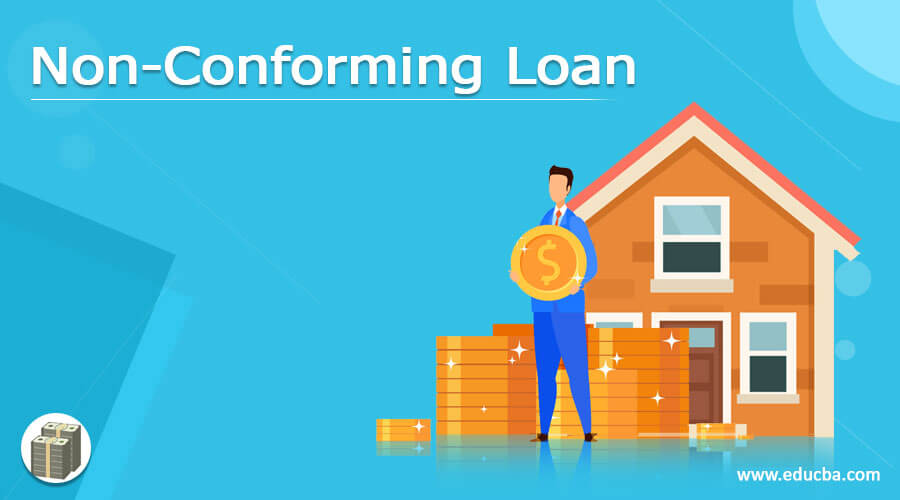Updated July 10, 2023
What is a Non-Conforming Loan?
The term “non-conforming loan” refers to the type of loan extended to borrowers who don’t qualify for traditional or conforming loans for various reasons, such as low loan-to-value ratio, weak credit history, or lack of collateral.
In addition, these loans are risky and can’t be re-sold to agencies like Freddie Mac or Fannie Mae. Further, the riskiness of these loans results in higher interest rates. Hence, borrowers should only go for these loans after trying the traditional ones.
Examples of Non-Conforming Loan
Let us take a simple example to understand the concept of non-conforming loans. John is planning to purchase a real estate property worth $500,000. As per general guidelines, John must be 20% of the property value as a down payment. Now, 20% of $500,000 comes to $100,000, which John currently doesn’t’ have. So, he will not be able to meet the criteria to get a traditional loan.
Despite having a clean credit history, John has to opt for a non-conforming loan because he doesn’t have the money to pay the required down payment. In addition, the interest rate for traditional loans is 3.5%, while for non-conforming loans, it is 6.5%, indicating a spread of 300 bps.
Types of Non-Conforming Loan
Various types of non-conforming loans cater to different borrower situations. The following are some of the most common types of non-conforming loans available in the credit market:
- VA loans: These loans are insured by the Department of Veterans Affairs and can only be availed of by armed forces members, veterans, and their spouses. These loans refinance 100% of the property value, and the borrowers are not required to pay down payments.
- FHA loans: These loans are insured by the Federal Housing Administration and allow the borrowers to purchase properties with as little as a 3.5% down payment.
- USDA loans: Backed by the US Department of Agriculture, these loans are for borrowers who want to buy real estate properties in rural or suburban areas.
- Jumbo loans: The borrowers who need funds exceeding Fannie Mae’s or Freddie Mac’s lending limits opt for these loans. Typically, these loans don’t charge much higher interest rates than conforming conventional loans. Still, the borrowers must meet stricter qualification criteria, such as a lower debt-to-income ratio, higher credit score, etc.
- Holding mortgages: In this type of loan, the seller assumes the role of a lender, and the home buyer makes periodic payments to the seller, who continues to be the titleholder of the property until the money is paid in full.
- Hard money loans: These are short-term loans offered by individuals or private companies, and the purchased properties are offered as collateral.
- Purchase money mortgages: These loans are common for buyers not qualifying for traditional bank financing. In this loan arrangement, the seller extends the loan to the buyer.
When Does a Non-Conforming Loan Work?
There are many situations where the borrower’s non-conforming loan is the only choice. Some of the most common situations in which non-conforming loans work the best are as follows:
- The borrower doesn’t have money to pay for the down payment
- The buyer wants a mortgage with lower credit requirements
- The buyer wants to purchase a very expensive property that exceeds traditional lending limits
- The borrower has negative marks on their credit history
- The borrower doesn’t’ qualify because of bankruptcy or similar credit negatives
Benefits of Non-Conforming Loan
Some of the major benefits of a non-conforming loan are as follows:
- Unlike conforming loans, the major advantage is that the borrowers must pay much lower or no down payment.
- Borrowers with good credit quality don’t need to put every penny of their savings towards their new home in the case of non-conforming loans.
- The approval process for these loans is short and can be quickly available.
Disadvantages of Non-Conforming Loan
Some of the major disadvantages of a non-conforming loan are as follows:
- Only borrowers with good credit scores (at least a minimum score of 660) and significant income can qualify for non-conforming loans.
- Reputed government institutions like the Federal Housing Administration or the Department of Veteran Affairs do not back most non-conforming loans.
- Typically, non-conforming loans are quite costly, given their riskiness. So, in case of adverse economic developments, the borrowers may find it challenging to refinance these loans resulting in foreclosure.
Key Takeaways
Some of the key takeaways of the article are:
- Non-conforming loans don’t adhere to traditional lending guidelines, so they can’t be re-sold to agencies like Freddie Mac or Fannie Mae.
- Lenders typically charge higher interest rates on these loans compared to conforming loans.
- Jumbo loans are the term for non-conforming loans surpassing conforming lending limits.
- Besides the loan size, some other criteria for non-conforming loans include credit score, loan-to-value ratio, debt-to-income ratio, and documentation requirements.
Conclusion
So, there is no doubt that non-conforming loans are useful funding options for borrowers who fail to meet the requirements to get loans traditionally. So, these loans help the credit market run smoothly. However, given the potential risks involved in these loans, they should only be extended to borrowers with good credit quality.
Recommended Articles
This is a guide to a Non-Conforming Loan. Here we also discuss the definition, example, types, and when it works, along with benefits and disadvantages. You may also have a look at the following articles to learn more –




